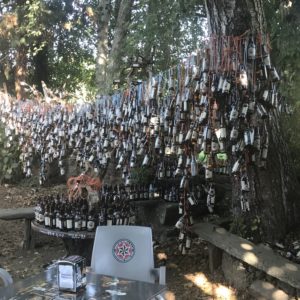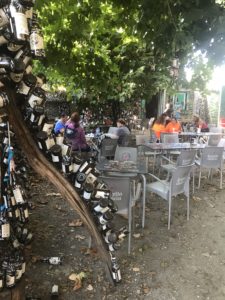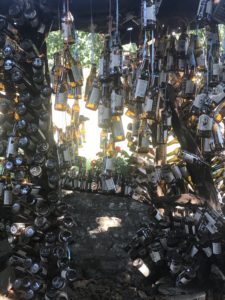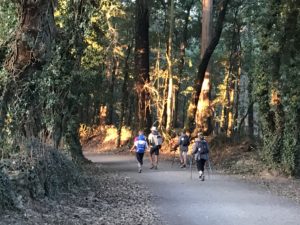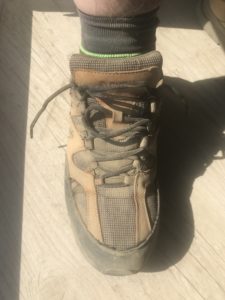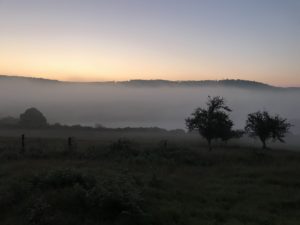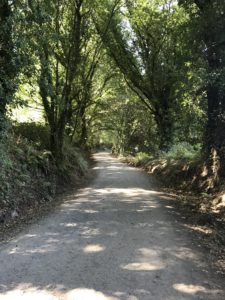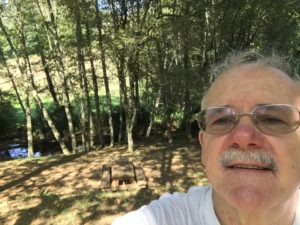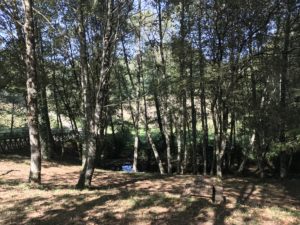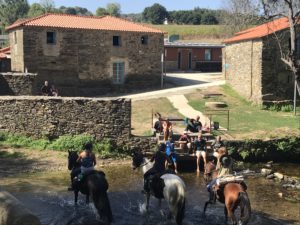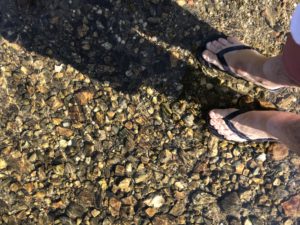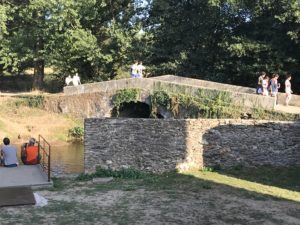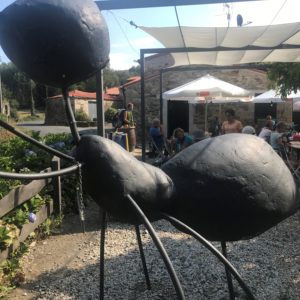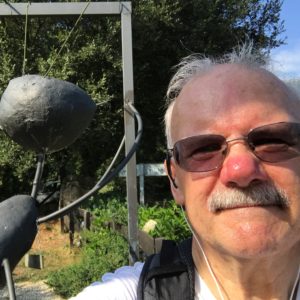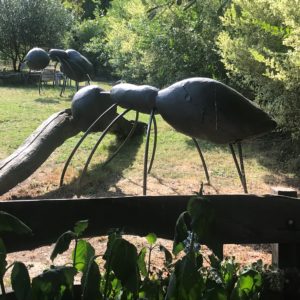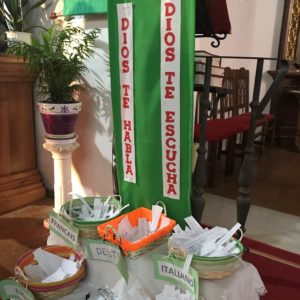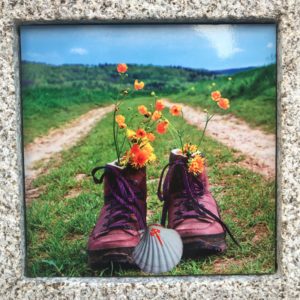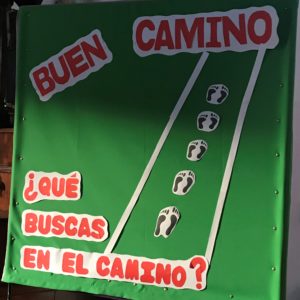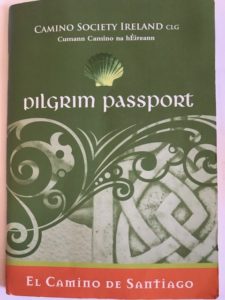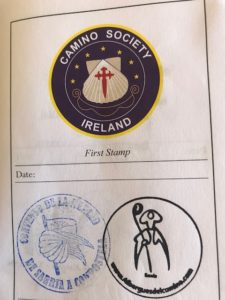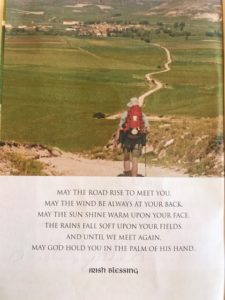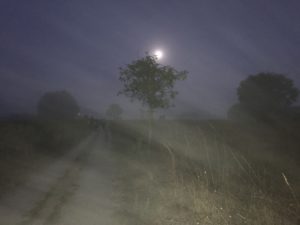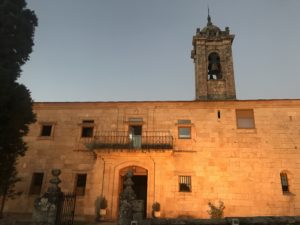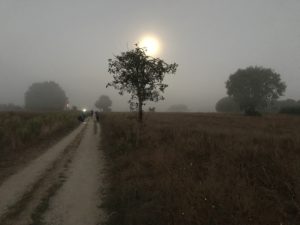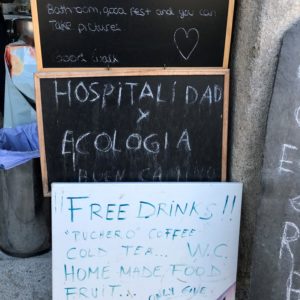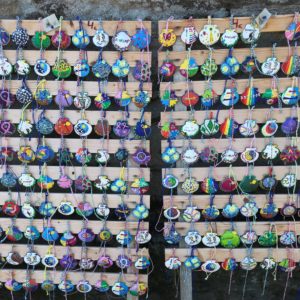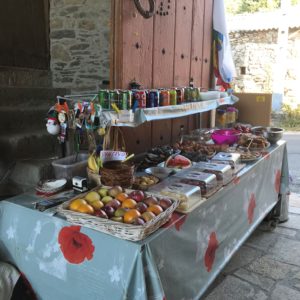Fr Michael’s Camino Diary: Day 4
In September, MSC Missons Office Director Fr Michael O’Connell MSC walked the Camino de Santiago for the first time. Walking approximately 113 km over five days, Fr Michael undertook the final stage of the Camino Francés, or the French Way. Here, he shares his daily diary with thoughts and reflections from the Way.
Saturday, September 29th
Ribadiso to Pedrouzo
Distance: 22.8 km
“Day 4 of my journey saw me set off once again along ancient paths that have been walked for thousands of years. Along the road, I came to a stop where pilgrims could buy a bottle of beer and write their name on it, and the owners would display it for a year, so anyone who passed could see who had gone before them. It was such a popular idea that it had actually moved premises with the owners, who had to find a new place to set up shop after the rent on their previous premises had become too high. It’s still going from strength to strength today, and it a lovely way to leave a marker, something of yourself, along a path that so many walk.
- Pilgrims leaving their mark along the Way.
- Pilgrims leaving their mark along the Way.
- Pilgrims leaving their mark along the Way.
While walking, I realised how lucky I was to have such good weather on my journey. I could see tide marks on some parts of the path, where the water rises when it rains. I was blessed with sunshine, and avoiding trudging through puddles and floods!
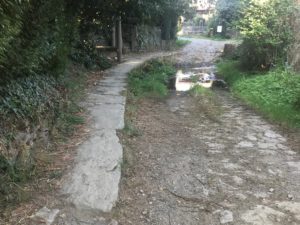
On the road today I came across a signpost, indicating Santiago to the left and Lugo to the right. It struck me as somewhat entertaining that I flew into Santiago Aiport, then took a two-hour bus journey to Lugo, followed by a half-hour bus journey to Sarria. When I finally arrived in Sarria, I promptly set off in the other direction, on foot. Talk about going backwards to go forwards!
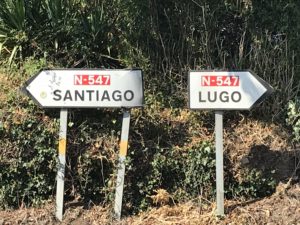
At the end of the day, just like the days before, my boots were coated in a thick covering of dust – and my once-black socks were now well and truly grey! On my Camino journey, I became very aware of shaking the dust off my feet. The Gospel speaks about doing just this (Matthew 10:14: ‘And if anyone will not receive you or listen to your words, shake off the dust from your feet when you leave that house or town.’). If you are rejected in a village, if the people there don’t want to hear your message, you should leave – and when you’re leaving, you should shake the dust off your feet. All of the things you accumulate in that village, you give a good shake on the way out, and just go away out of the place leaving all of the negativity behind you.
The Camino experience is similar. You start off with nice clean shoes or boots, and at the end of the day, you see that they’re covered in dust, things that you have picked up during the day without realising it. It’s important to give them a good shake at the end of the day, to shake off the dust and debris you’ve picked up along the road, and start off afresh the following day.
- Shaking off the dust: The Camino reminds us of the importance of getting back to basics.
- Shaking off the dust: The Camino reminds us of the importance of getting back to basics.
- Shaking off the dust: The Camino reminds us of the importance of getting back to basics.
This really came into my conscious as I was travelling. We begin life with an ideal, and then life itself takes over. You begin to accumulate things around your life, and you’ve forgotten that simple ideal, or the ideal you had in your youth. It’s only when you take time out to stop and think that you realise, I’m accumulating too many things here; I need to take time out and go back to the basics, take a step back.
This could take the form of the simplest things. The importance of a day off during the week, for example – the Sabbath experience. You stop your usual day-to-day schedule; you don’t go to work. You shake off the dust of the week. You decide that today is a family day, a day when we do things together. Sometimes, you must say no to life’s demands. You might look at the time you spend with your partner or your family, and say no – we’re going to have a date night or a family night this Friday night. It’s not just going to be a normal busy dinner time, we’re going to turn off the television and light a candle and share a meal. We’re going to go back to basics.
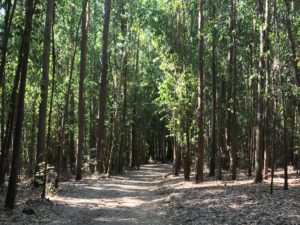
It’s important that we don’t just do this when we go on retreat, or celebrate an anniversary or a special occasion. We must make it a day-to-day occurrence. We must shake off the dust of life and start fresh every day, with a basic appreciation of all that God has given us and the wonders that life has to offer us.
If there’s one thing I stepped back and appreciated about today, it was the massage shower in the hostel at the end of the day’s walk! It really is the simple things…”
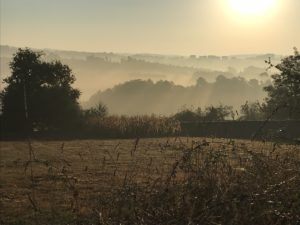
Read more of Fr Michael’s Camino diary:
Fr Michael’s Camino Diary Day 1
Fr Michael’s Camino Diary Day 2
Fr Michael’s Camino Diary Day 3
Fr Michael’s Camino Diary: Day 3
In September, MSC Missons Office Director Fr Michael O’Connell MSC walked the Camino de Santiago for the first time. Walking approximately 113 km over five days, Fr Michael undertook the final stage of the Camino Francés, or the French Way. Here, he shares his daily diary with thoughts and reflections from the Way.
Friday, September 28th
Palas de Rei to Ribadiso
Distance: 25.6 km
“As I walked along on the third morning of my Camino journey, I heard the unexpected sound of music playing at the crossing of a stream. On reaching the other side, a young lady came into view, playing Spanish bagpipes. She was a busker, out in the middle of nowhere, and it was a wonderful surprise for a weary pilgrim!
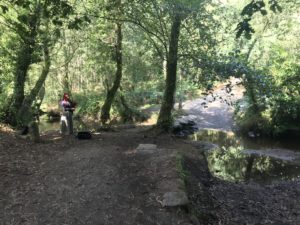
I paused for a while at the church of Boente Cruce, where there was a beautiful sanctuary with peaceful music playing. My guide book recommended this church, noting that the parish priest is especially friendly – and there was certainly a warm welcome to be found here.
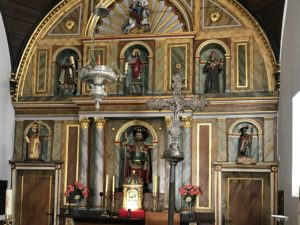
I found myself walking along a particularly scenic stretch, where I stopped to snap a picture of the view. It looks like an idyllic scene – but what you can’t tell from my photograph is that it’s right beside a motorway, so pilgrims can hear the traffic whizzing past as they walk. It didn’t bother me too much; it struck me as being a bit like life. I could choose to hear the traffic and allow it to destroy my peace, or I could accept the noise as part of the hum and the energy of the place and enjoy the journey.
- Finding peace alongside the noise of traffic on the walk from Palas de Rei to Ribadiso.
- Finding peace alongside the noise of traffic on the walk from Palas de Rei to Ribadiso.
- Finding peace alongside the noise of traffic on the walk from Palas de Rei to Ribadiso.
One thing I noticed along the journey was the struggles that some people had, and the way people helped each other. I saw one young man helping his elderly mother to walk the Way, and it was a joy to see them have such a special experience together. Some people were battling with real challenges, and their commitment to walking the path was amazing. There were people with bandages and strappings on their legs, and still, they were cheerful. That is an incredible element of the walk – the cheerfulness!
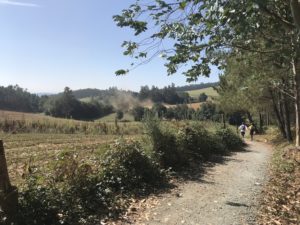
I stayed in Ribadiso da Baixo that evening, a hostel that was recently refurbished and opened to the public. It dates back hundreds of years and the location is stunning, next to a medieval bridge on the River Iso. It was a real treat to be able to bathe my feet in the stream after three days of walking. It’s not possible to pre-book a bed here – the first 62 pilgrims to arrive on any given day can claim a bed, and I was determined to be one of them! At just €6 a night, this hostel is non-profit-making, but is funded by the council and maintained by village volunteers.
- The peaceful surroundings of Ribadiso da Baixo.
- The peaceful surroundings of Ribadiso da Baixo.
- The peaceful surroundings of Ribadiso da Baixo.
Hostel living is certainly an interesting part of the Camino experience. The smallest dormitory I was in slept around 10 or 12 people, while the largest had space for 130 people. When you arrive, you must claim your bunk and the space around it, while also respecting other people’s need for space, too. A big challenge is trying to charge your mobile phone – it’s a challenge of Christian charity not to leave your own electronics plugged in to charge all the time! The next job is to shower after the walk of the day, and then wash your clothes. All of the hostels along the Way are well-equipped with laundry services, costing just a few Euro for use of the washing machine and tumble dryer.
Of course, I found I had packed more than I needed – just as we often take too much with us in life. You think, I’ll need a shirt in the morning, a shirt in the afternoon, and a shirt in the evening. Then you find that actually, you don’t need all those clothes. I only need two, not three, or I can wash my shirts in the evening. We tend to live with a ‘wash one, wear one, spare one’ lifestyle, but I found I didn’t actually need the spare one; I could just wash one and wear one, and it worked away fine. Another lesson about carrying too much!
I had booked a room in a hostel nearby as a contingency plan, but luckily, I got to Ribadiso da Baixo early enough that I didn’t need it and was able to claim a bed there. I enjoyed a lovely dinner and an early night; the bar and restaurant were dead by 9.30pm. Everybody had gone to bed, ready for another early start the following day.”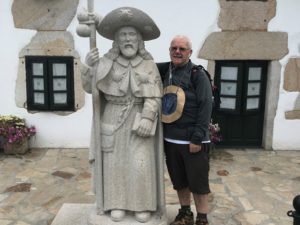
Read more of Fr Michael’s Camino diary:
Fr Michael’s Camino Diary Day 1
Fr Michael’s Camino Diary Day 2
Fr Michael’s Camino Diary Day 4
Fr Michael’s Camino Diary: Day 2
In September, MSC Missons Office Director Fr Michael O’Connell MSC walked the Camino de Santiago for the first time. Walking approximately 113 km over five days, Fr Michael undertook the final stage of the Camino Francés, or the French Way. Here, he shares his daily diary with thoughts and reflections from the Way.
Thursday, September 27th
Portomarín to Palas de Rei
Distance: 24.8 km
“Day 2 of my Camino journey got off to a dramatic start, with thunder and lightning crashing and rolling from 7.00am. The skies soon cleared, and my journey continued on a stretch of almost 25 km, from Portomarin to Palas de Rei.
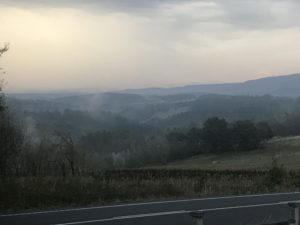
On the road, I stopped off at a place called Bar Trisquel, where I wanted to buy some batteries for my CD player. The people who ran the shop didn’t understand what I was looking for, and eventually I showed them what I needed. As it happened, they didn’t sell batteries, but the shop assistant disappeared into the back and returned with two batteries, taken from one of their own gadgets.
This is just one example of the wonderful hospitality I experienced along the Way. Pilgrims are welcomed with open arms, and unlike popular tourist areas here in Ireland, nobody is out to rip you off. A cup of coffee costs around €1, a hearty lunch is about €5, and pilgrims can get a full three-course dinner for €10 – with a glass of wine included! Those you meet along the road are generally very welcoming, and the warmth of their kindness and hospitality – demonstrated perfectly by the gift of batteries – has stayed with me.
- Giant sculptures of ants at the church of Vilar de Donas In A Paso de Formiga.
- Giant sculptures of ants at the church of Vilar de Donas In A Paso de Formiga.
- Giant sculptures of ants at the church of Vilar de Donas In A Paso de Formiga.
Once again, the scenery along the road was nothing short of breath-taking. Although it’s tempting to stop and drink it all in, it’s equally as important to keep moving, so you can hit your daily destination. It was a balancing act that put me in mind of finding balance in life itself. If I stopped and admired the scenery for too long, then I didn’t move along the path. I could have spent all day looking at the sun rising and setting, or sitting having a coffee, looking out a lovely landscape – but the work wouldn’t get done. It’s important to appreciate what’s around you, but if you lose yourself in it, you’re not moving forward.
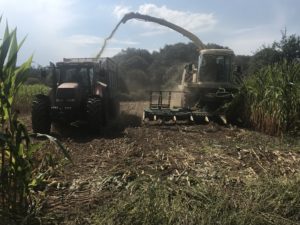
In the evening, I went to the pilgrims’ Mass at a beautiful church in Palas de Rei. Here, Spanish signs asked what we were searching for on the Camino, with reminders to speak to and listen to God. Beneath these signs were little baskets containing slips of paper in different languages. These pieces of paper were printed with encouraging messages like ‘You are God’s precious one,’ and quotes from Scripture. They were a lovely thought to keep in your pocket and take with you along the Way, and this was a particularly nice way to end the day.”
- Messages of encouragement for pilgrims on the Way.
- A beautiful image at Fr Michael’s hostel in Palas de Rei.
- “What are you searching for on the Camino?”
Read more of Fr Michael’s Camino diary:
Fr Michael’s Camino Diary Day 1
Fr Michael’s Camino Diary Day 3
Fr Michael’s Camino Diary Day 4
Fr Michael’s Camino Diary: Day 1
In September, MSC Missons Office Director Fr Michael O’Connell MSC walked the Camino de Santiago for the first time. Walking approximately 113 km over five days, Fr Michael undertook the final stage of the Camino Francés, or the French Way. Here, he shares his daily diary with thoughts and reflections from the Way.
Wednesday, September 26th
Sarria to Portomarin
Distance: 22.1 km
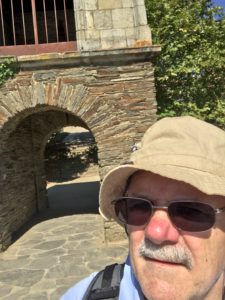 “Walking the Camino was a new experience for me. This was the first time I had done it, and while it had come highly recommended by our Vocations Director Fr Alan, who walks the Way of St James every year, I can’t say that I wasn’t slightly apprehensive about the challenge that lay ahead.
“Walking the Camino was a new experience for me. This was the first time I had done it, and while it had come highly recommended by our Vocations Director Fr Alan, who walks the Way of St James every year, I can’t say that I wasn’t slightly apprehensive about the challenge that lay ahead.
The walk was a challenge in itself, in that it’s a long time since I took long walks, and this one averages approximately 20 km per day. I walked the final stage of the Camino Francés, from Sarria to Santiago, covering around 113 km in 5 days.
I must admit, I asked myself ‘Can I do that?’ Walking the distance is one thing, but will my knees hold me up? How will my joints cope? It was up hill, down dale at times, but it wasn’t as difficult as I thought it would be, and that was a real positive.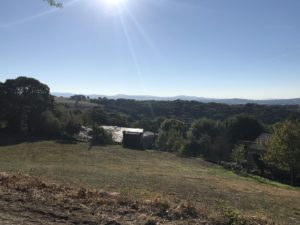
What made me decide to do the walk this year? Well, I wanted to do something that was healthy for both body and soul. Fr Alan, had been saying how wonderful the Camino was after his trip earlier this year, and so I decided to give it a go.
- Irish Pilgrim Passport for the Camino de Santiago.
- Irish Pilgrim Passport for the Camino de Santiago.
- Irish Pilgrim Passport for the Camino de Santiago.
I started the first day of my Camino journey waking up in an old monastery, and stepped out into a beautiful misty morning. I often found myself following in the path of other pilgrims, which was useful – it lessened the chances of getting lost along the way!
- A misty morning on Day 1 of Fr Michael’s Camino adventure.
- On the night before he began his Camino walk, Fr Michael stayed in an old monastery that had been converted into a hostel for pilgrims.
- A misty morning on Day 1 of Fr Michael’s Camino adventure.
On the first day, I spotted this well-loved spot, where a local farmer obviously finds time for rest and recuperation after a busy day. He has all the essentials at hand – a comfy chair, a newspaper, and a bottle of wine! In a place where there is so much transition, it was nice to see a symbol of consistency from someone whose roots are in the land here.
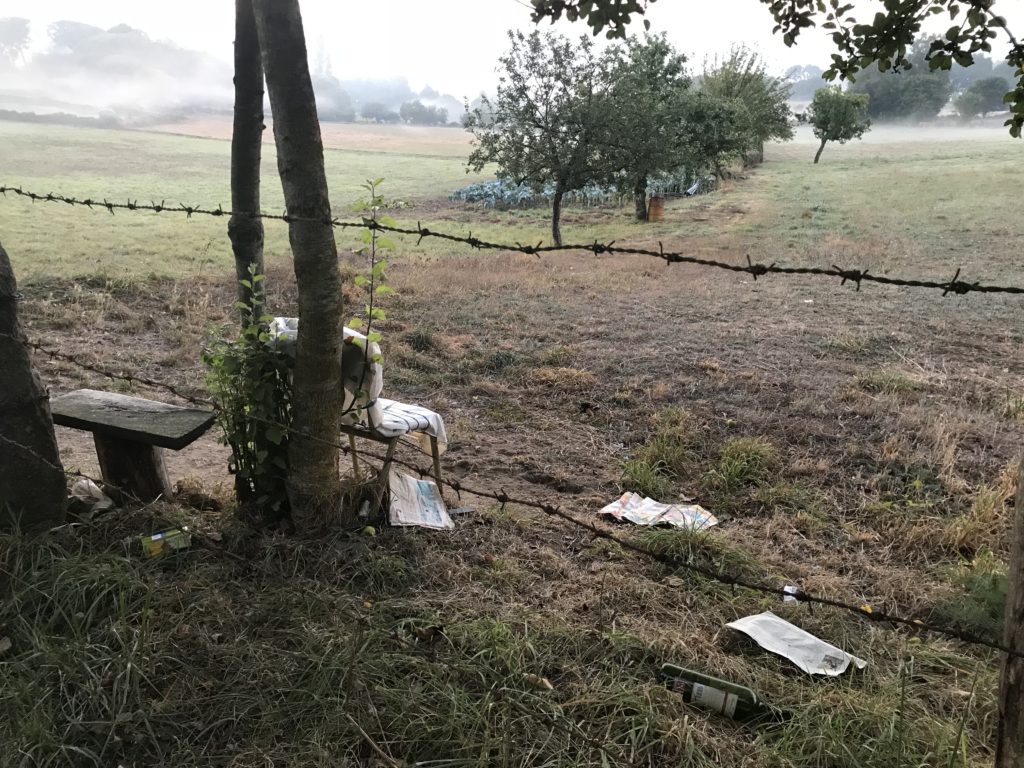
I also happened upon a stall full of eco-produce, where I enjoyed a chat with the owner. He has no prices on his wares, but simply requests a donation from pilgrims. His sign was a welcoming one, promising tea, coffee, home-made food, a bathroom, and a good rest.
- A welcoming sign at a rest stop along the walk from Sarria to Portomarin.
- The famous Santiago shells, often seen on pilgrims’ backpacks as they walk the Way.
- Eco-produce at a welcoming rest stop along the walk from Sarria to Portomarin.
I had decided to walk the Camino on my own. If you’re walking with somebody, it does shorten the journey – we all know the old saying, ‘Tell me a story and half the journey!’. Actually, I found that walking by myself gave me time to think and to reflect, to see the world and what was around me. I only had myself for company, and the Lord. While it was a physical challenge, it wasn’t at all challenging mentally. It was like life really, just taking one day at a time and seeing where it brought me.”
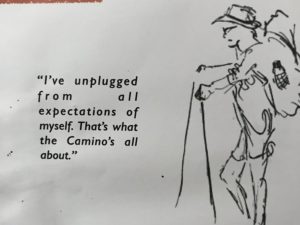
Read more of Fr Michael’s Camino diary:
Fr Michael’s Camino Diary Day 2
Fr Michael’s Camino Diary Day 3
Fr Michael’s Camino Diary Day 4
Gospel Reflection for the Twenty-Ninth Sunday in Ordinary Time | October 21st
Gospel Reflection
In Dialogue with Questions of the Day: The Servant Church
Gospel (Mark 10:35-45): The Son of Man came to give his life as a ransom for many.

The Church is often criticized today for being far removed from the teaching and model set by Jesus and put before us in Mark’s Gospel – and rightly so. In the first instance, Jesus’ words are addressed to his apostles. The model of the then civil government was not to be for them. Jesus’ teaching on service, and being servants to one another in the Christian community became common and is central, for instance, to Pauline teaching on the Christian community. Central to the message of today’s Gospel reading is Christ himself as model; self-promotion takes attention away from this.
But to return to the apostles and their successors: the model of service is central to Paul. For the sake of the Gospel he became the servant of all, to win all for Christ. As Jesus reminded his apostles, anyone wishing to become great was to be the servant of all. This did not take from the mission to preach the Gospel. As ministers of the Gospel, all were equal, with the same mission from God. The apostle Paul could present himself as the servant of all, but could make it clear that as apostle he preached the Gospel with the confidence that came from his apostolic calling. He could say: “Not I say, but the Lord”. He handed on what he himself had received from the Lord and from earlier Christian tradition.
Applying the Gospel message to the Church of our own day, we can certainly say that the message of being servants of one another applies to the successors of the apostles, and to all Christians. While criticizing the Church for deviation from the Gospel message, one may also note that this should not take from the Church’s prophetic mission to preach the full Gospel message as required in our own day, without fear or favour. In so doing the Church has the model of St Paul, all things to all people, as minister of the Gospel of God.
Fr Martin McNamara MSC
Love and Light: Inspirational Candles from MSC Missions
As the evenings draw in and the days get cooler, bring a little light to someone you love with a beautiful candle from our collection of inspirational gifts.
In today’s world, where it’s all too easy to get caught up in the hustle and bustle of our busy lives, taking part in the age-old ritual of lighting a candle is the perfect way to pause for a moment at the end of a hectic day. Whether we light a flame in reflection, in thanksgiving, or in prayer, lighting a candle is a time-honoured way of taking time out of our daily routine to take stock and rest our minds.
You might choose to take a moment to light up your morning routine, to breathe and reflect before you dive into your day’s schedule. Perhaps you prefer to take that time at the end of the day, letting go of the day’s demands and stresses by the light of a flickering flame.

With two styles to choose from, the gold-embossed labels and attractive designs make these candles a special gift for yourself or for others. The pretty Faith, Hope, and Love design is a lovely reminder of the gifts that we give and receive daily. Our Serenity design features the beloved Serenity Prayer, surrounded by a charming autumn leaf motif. With four candles in every pack, you can share a little more light and love with those you hold dear.
Remember, when you choose one of our inspirational candles, you are lighting up the lives of people in need all over the world. Your support helps us to continue bringing the gift of hope to vulnerable families and communities across the globe. Our MSCs work in regions of extreme poverty and hardship, bringing vital aid to people who have nowhere else to turn, and every order we receive makes a real and valuable difference.
BROWSE OUR INSPIRATIONAL CANDLES
From student to teacher: Kasparina’s Story
Kasparina Renwarin is a teacher and a former student at Siwa Lima St Joseph’s Technical School in Langgur, Indonesia. Built in 1970, the school is run by the Missionaries of the Sacred Heart with the aim of educating young people in the region so “they can do something good for themselves and for their families”. In a region where poverty is a pressing issue, St Joseph’s provides the youth of the community with hope for the future. Here is Kasparina’s story:
“My name is Kasparina Renwarin and I am 53 years old. I have been a teacher in St Joseph’s Technical School since 1983.
When the school first opened, it was attended by male students only. Female students did not begin to attend St Joseph’s until 1979. I was one of six ladies who began studying in the school together.
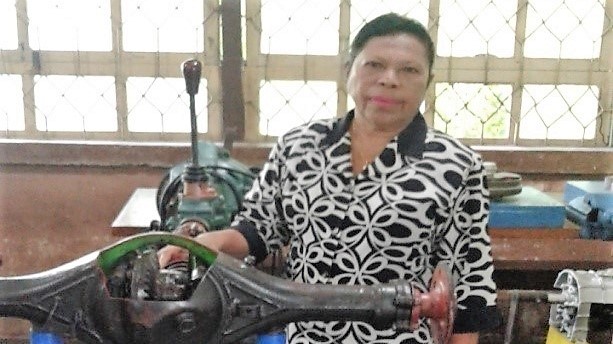
I finished my studies in 1982. In 1983, the headmaster at the time invited me to teach in the automotive department and I was very happy to get this job, even though I was not an expert in the subject. I do my best for my students. Although my salary is low, I wish to dedicate myself and my skills to my beloved alma mater.
I realised that I needed to develop my knowledge and my ability in the automotive department further, so I continued my studies. In 2014, I became a civil employee as a teacher, and I remain teaching in my alma mater.
I hope that St Joseph’s Technical School remains constant, and continues to develop to become the best technical school in the Malucu Province. God bless us all, and our beloved St Joseph’s!”
PLEASE HELP US TO TRANSFORM LIVES IN INDONESIA
Guardian Angel Gifts
“Ever this day, be at my side, to light and guard, to rule and guide…”
We all draw comfort from our guardian angel, a peaceful presence on our shoulder that guides and guards us always.
- MSC Guardian Angel Gifts
- MSC Guardian Angel Gifts
- MSC Guardian Angel Gifts
Our beautiful range of guardian angel gifts are the perfect way to honour our angel guides, or to remind someone we love that they are never alone. In times of trouble or stress, when there’s a big decision to be made, or when we simply feel a little bit lost, we turn to the angelic messenger who guides our footsteps and leads us along the right path.
From an elegant silver-plated bracelet adorned with a delicate angel charm, to a collection of angelic statues featuring encouraging messages, our angel gifts are wonderful keepsakes to inspire and enchant.
- MSC Guardian Angel Gifts
- MSC Guardian Angel Gifts
- MSC Guardian Angel Gifts
When you choose one of our guardian angel gifts, your gesture goes further than you can imagine, bringing the gift of hope to vulnerable families and communities around the world. Our MSCs work in regions of extreme poverty and hardship, bringing vital aid to people who have nowhere else to turn. Every order we receive makes a difference, allowing our MSCs to continue their work in transforming lives across the globe.
Pick the perfect present for someone special, or find your own personal reminder that your guardian angel is never far from your side. This lovely collection of angel mementos will bring delight to all who hold their guardian angel dear.
EXPLORE OUR GUARDIAN ANGEL GIFTS
Gospel Reflection for the Twenty-Seventh Sunday in Ordinary Time | October 7th
It is not good for man/woman to be alone
Gospel Reflection: Mark 10:2-16
God has created us as relational. It is not good for us to be alone. This is an important message for us in this very individualistic age.
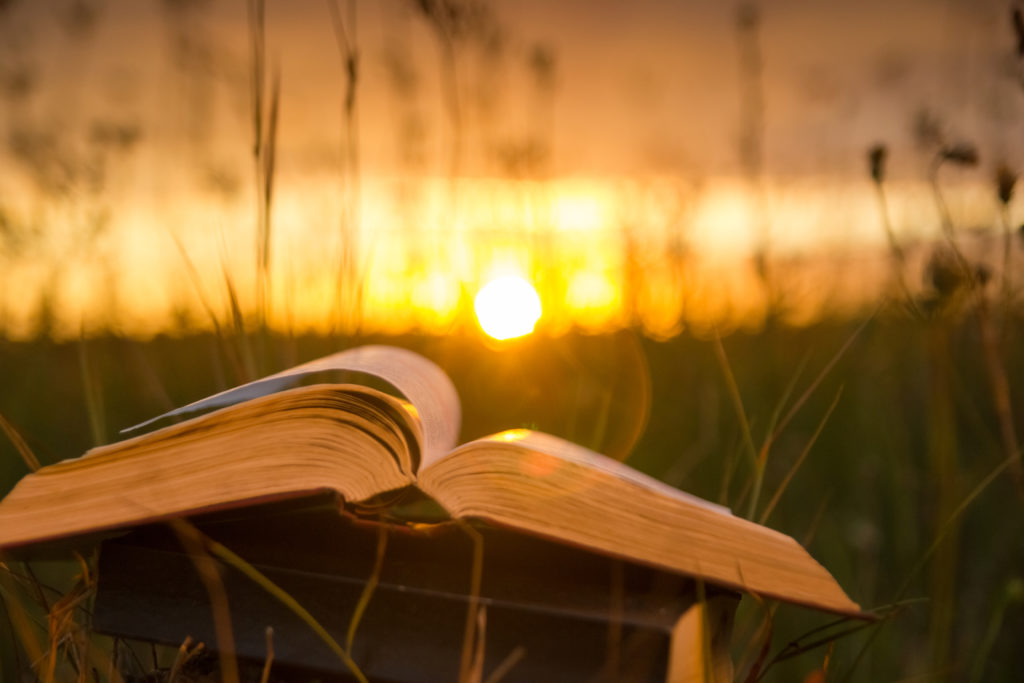
Jesus is asked if divorce is OK. His response is to recall God’s original vision for us. God made us for one another. For most people, this takes the shape of finding one special person and forming a special relationship. Those who are single also live in relationship with other people. Without such connection people become sick, both physically and mentally.
In Romania, under communist rule, many orphans were kept in institutions where they were deprived of human touch. Even though these children were fed and given enough to drink they became sick and some died. For human beings to live and thrive, they need touch, love, relationship.
However, the kind of relationship that people need is deep rather than superficial. Unfortunately, today, many people see relationships as almost a commodity. Something to be taken off the shelf and replaced when it no longer suits. This is not how God made us. For relationships to grow, they must pass through difficulty and struggle, confusion and understanding, forgiveness and reconciliation. Without working through the problems, relationships never deepen.
Jesus invites us to accept our need of deep relationship. That is not to say that sometimes relationships end. However, God’s dream for us remains deep, long-lasting, and life-giving relationships.
Fr Con O’Connell MSC
MSC Missions: Venezuela in Crisis
In the summer of 2017, the Missionaries of the Sacred Heart marked their Golden Jubilee in Venezuela, 50 years after our missionaries first started their work in this troubled country. Today, Venezuela is deep in the worst political, social, economic, and humanitarian crisis ever experienced in the country’s history, and our MSCs are the only Irish priests working to bring relief to local communities caught in the midst of this social and political turmoil.
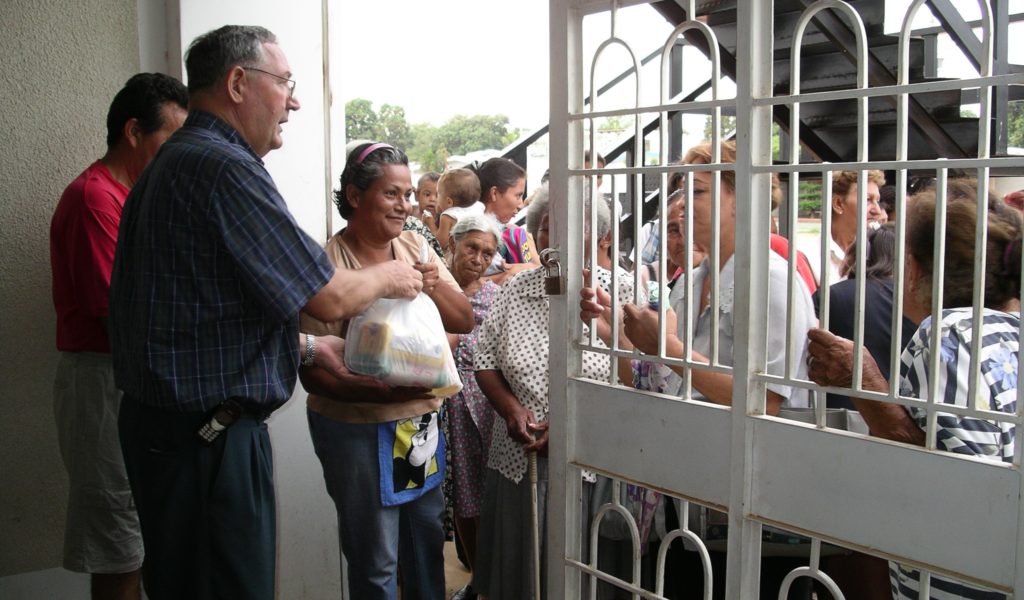
“A serious, volatile, and rapidly deteriorating situation.”
Simon Coveney, Tánaiste and Minister for Foreign Affairs and Trade, recently addressed the issue of the Venezuelan crisis, highlighting the “serious, volatile, and rapidly deteriorating situation”, where “reports of human rights violations are a cause of real concern”.
Pope Francis has also spoken out about the situation in Venezuela, following a meeting with the Catholic Bishops’ Conference of Venezuela in Rome. Archbishop Luis Azuaje Ayala, President of the Catholic Bishops’ Conference of Venezuela, and Archbishop of Maracaibo, spoke about the Pope’s interest and empathy, stating “The Pope did not simply listen to us, he expressed himself on the importance and value of the Church in Venezuela”.
Those who can raise enough money are fleeing the country to escape from the volatile social, political, and economic climate. Following a visit to Venezuela last year, Fr Joseph McGee MSC said, “People are doing all they can to leave the country and start a new life”. Archbishop Azuaje reiterates this, dividing the migrants into three categories: those who emigrated to Venezuela and are now returning to their countries of origin; professionals and business people who are leaving to work elsewhere; and the poor, who are fleeing for their lives, on foot and without money or provisions.
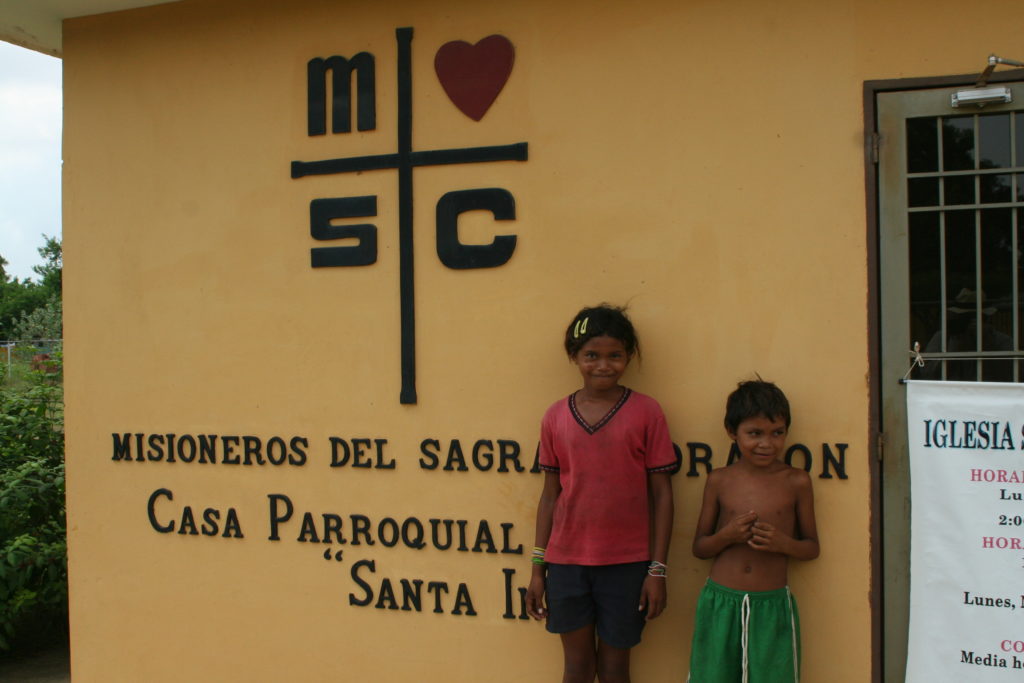
“Stay close to the people of Venezuela, especially to those who are suffering.”
Continued hyperinflation means that the price of necessities is sky-high, far beyond the means of people who are struggling to survive. “The most difficult thing I witnessed was seeing people scavenge in the rubbish heaps for scraps that have burst through the overflowing rubbish bags and appear to be edible,” recalls Fr Joe McGee MSC, a state of affairs that Archbishop Azuaje echoed in his meeting with the Holy Father.
Pope Francis spoke with the Venezuelan bishops, encouraging them to “stay close to the people of Venezuela, especially to those who are suffering”. Our MSCs continue to do all they can to support those who are worst affected by the ongoing crisis, offering some hope to those who have nowhere else to turn.
PLEASE SUPPORT OUR MSC MISSIONS
Read Fr Joe McGee’s reflections on Venezuela here.
The Venezuelan Community in Ireland have reached out to thank the Missionaries of the Sacred Heart for our ongoing ministry in Venezuela.
Read their letter here.
MSC Pilgrimage to Lourdes 2018
Each year, the coming of September sees a flurry of activity at the MSC Missions Office as we prepare for our annual pilgrimage to Lourdes. This year’s pilgrimage took place from September 17th to 22nd, and as ever, it was a wonderful journey for all involved.
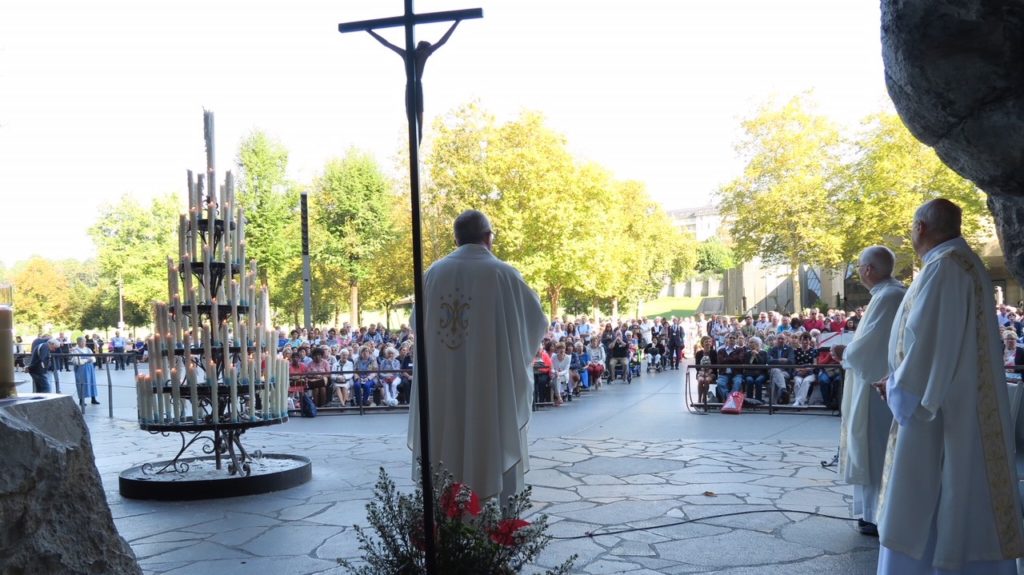
MSCs Fr Michael O’Connell, Fr Tim Gleeson, Fr Joe McGee, Fr Eugene Clarkson, and Spiritual Director Fr Charles Sweeney joined our pilgrims on this year’s trip. The opening Mass, which saw 80 pilgrims join together in prayer and song, marked a beautiful beginning to what was a truly enriching journey for all.
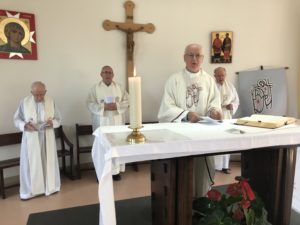
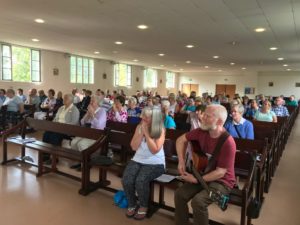
Mass at the Grotto of Our Lady of Lourdes is always a highlight of the pilgrimage, and this year was no exception. Here, the sun shone on our MSCs and pilgrims and they prayed for our MSC mission friends and benefactors in the magnificent surroundings of the Grotto.
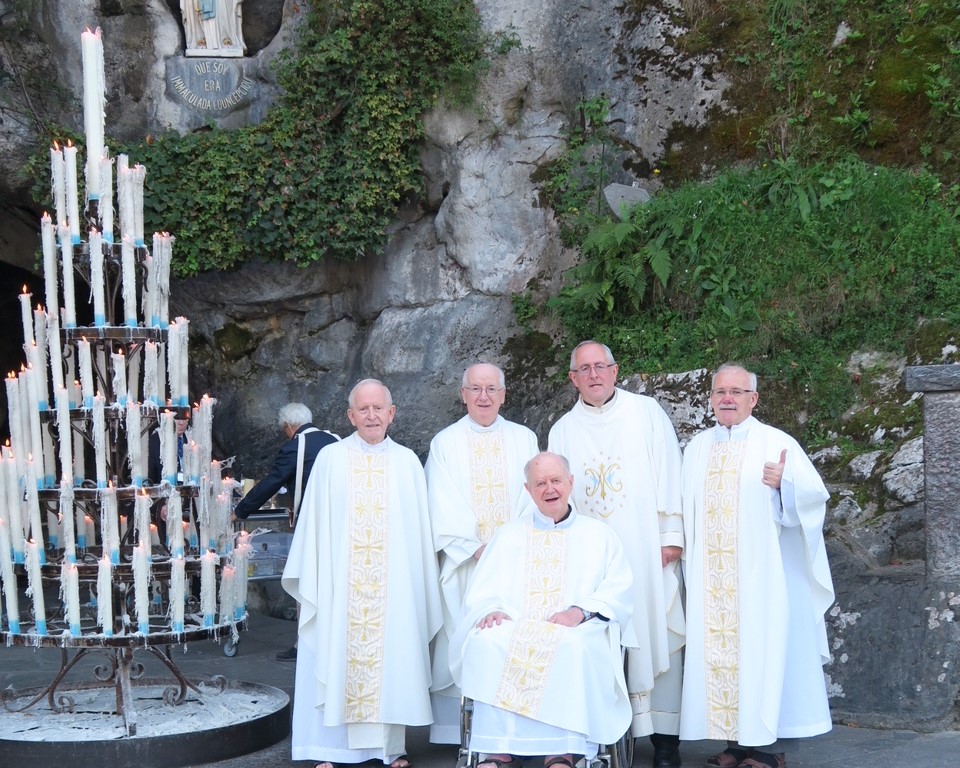
Another very special stop on this year’s pilgrimage was Mass at Sheepfold Chapel. This rustic chapel dates back to the 1800s, when St Bernadette would shelter her sheep under its thatched roof. With a great sense of peace and serenity residing here, Mass was an especially memorable occasion for our MSCs and pilgrims.
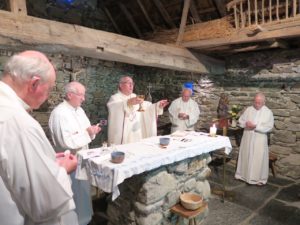
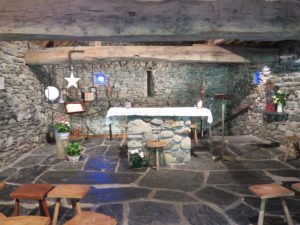
Many thanks to all involved in making this year’s pilgrimage such a rewarding one, where many happy memories were made, new friendships blossomed, and old acquaintances were fondly renewed. Until next year!
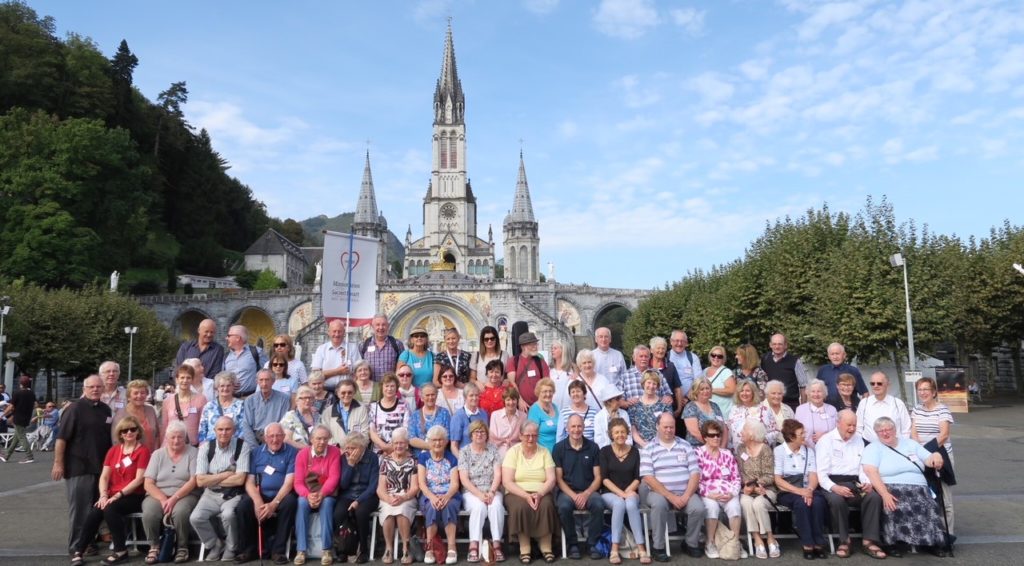
If you would like to find out more about the annual MSC pilgrimage to Lourdes, please click here.
MSCs battle floods in Kerala, India
In August, much of the state of Kerala, India, was submerged following devastating floods with the highest recorded rainfall in almost 100 years. Indian Union Secretary Fr Syam Kumar MSC writes to tell us about the terrible destruction caused at the Sacred Heart Seminary in Kanjoor, Ernakulam.
A Deluge in God’s Own Country
“The floods in Kerala caused the deaths of hundreds and drove many millions out of their homes. With the highest rainfall in nearly a century, Kerala state hit the headlines of every newspaper in the country. God’s own country was drowned; we MSC in Kerala were also affected very severely by the unprecedented rainfall and the unexpected rising of the water levels in the River Periyar which flooded our campus in Kanjoor village. Like many millions who were afflicted by the Kerala floods, our men were also forced to flee for their lives, fearing the deluge.
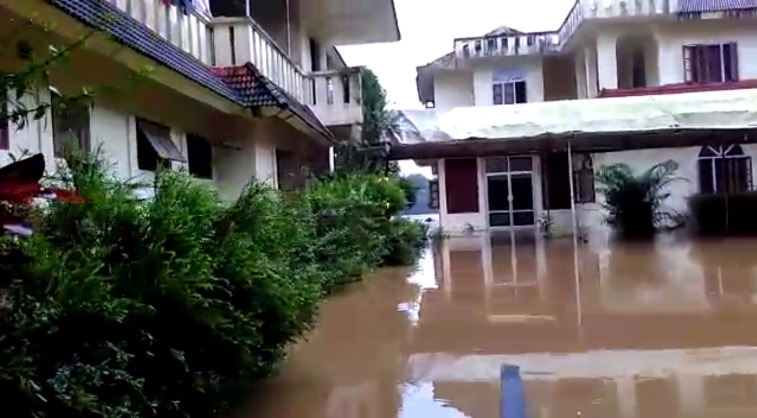
Located by the bank of the River Periyar (which means ‘big river’, and indeed it is a big river), is our seminary. The seminary was built to train our men in their Novitiate year, and is most suitable for prayer, reading and reflection. The beauty of the view of the river from our campus is so serene that many who visit this campus would love to visit us again and again. Many say that they love to while away the time, simply sitting there.
“The water level in the river started rising to alarming heights.”
Since the unusual rainfall during this monsoon, the water level in the river started rising to alarming heights. On August 15th, our confreres went to the parish church for the blessing of the newly refurbished church. Once they returned from the celebrations, the priests and brothers realised that continuing to stay at the seminary would be life-threatening, and they started shifting every mobile piece of furniture, home appliances, utilities, and whatever else they could, from the ground floor to the first floor. They managed to move many things safely. The local parish priest of St Mary’s Forane church, Rev Fr Pottackal Varghese, opened his presbytery for our priests and students to stay there on the evening of August 16th.
For four nights, our men took shelter at the parish presbytery. Along with our men, many people whose houses were drowned in the flood also took refuge on the church premises. Men and women, together with children; the camp sheltered over three thousand people. A couple of our students shared with me how they felt sorry for the children struggling because of the flood, leaving their houses and their comforts and standing in long queues to get their stomachs filled with meagre porridge. It is very heart-breaking for anyone to see children struggling.
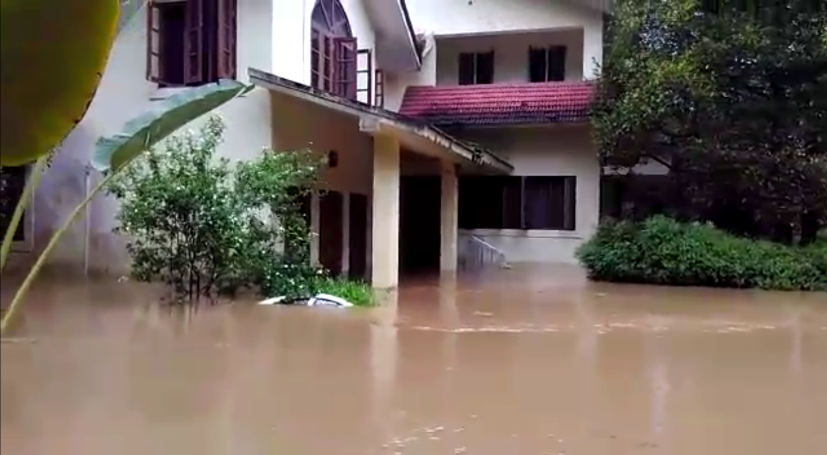
“The decreased rainfall came as a long-awaited relief… Tougher times were still ahead.”
As our men were away from the community, water levels gradually rose to the highest level, flooding the whole campus. At the entrance, the water level was even neck deep. The electricity department disconnected the power to the campus. Fr Baskar Raj, with the help of our neighbour, managed to get into the campus on a boat to capture the devastating and shocking scene at Sacred Heart Seminary. The video was in circulation through WhatsApp and other social media to our confreres in India and abroad. Everyone who saw the video was overwhelmed by shock and dismay at the extent of water that engulfed our beautiful campus. After a couple of days, the water level eventually subsided. Though the reduced water level on the campus and the decreased rainfall came as a long-awaited relief, once our men went to see the campus, the sights that greeted them left them in shock and horror. Only then did they realise that tougher times were still ahead.
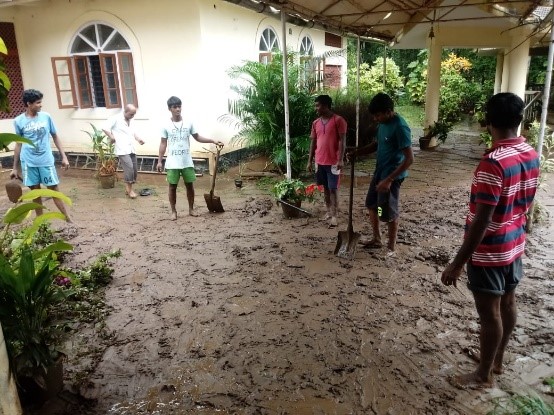
“There was danger from snakes and poisonous insects hiding in the house.”
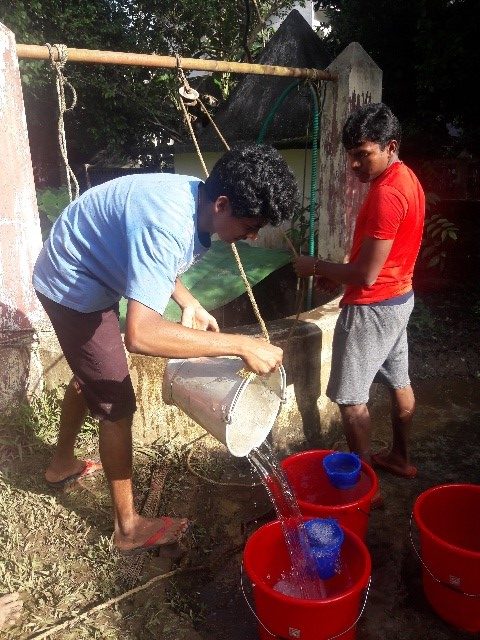 Fr Baskar Raj and Fr Francis Babu visited the seminary periodically to see if anything needed their immediate attention. Fortunately, the water levels reduced, but the house still remained in a terrible state. Though it stopped raining and there was no threat from the water, the danger from the remnants of the flood seemed much more deadly than the flood itself. With so much slush and waste stagnated on the floor of every living area, cleaning the house seemed an endless task. In addition to being a laborious task, cleaning of the house was, in fact, hazardous to the community’s health. There was danger from snakes and poisonous insects hiding in the house; as it was unavoidable, our men had to kill a snake. But with dedication and with uncomplaining commitment, our confreres and the students pulled their spirits and energy together.
Fr Baskar Raj and Fr Francis Babu visited the seminary periodically to see if anything needed their immediate attention. Fortunately, the water levels reduced, but the house still remained in a terrible state. Though it stopped raining and there was no threat from the water, the danger from the remnants of the flood seemed much more deadly than the flood itself. With so much slush and waste stagnated on the floor of every living area, cleaning the house seemed an endless task. In addition to being a laborious task, cleaning of the house was, in fact, hazardous to the community’s health. There was danger from snakes and poisonous insects hiding in the house; as it was unavoidable, our men had to kill a snake. But with dedication and with uncomplaining commitment, our confreres and the students pulled their spirits and energy together.
As the electricity was still disconnected, the only source of water was the well. Students had to draw buckets and buckets of water from the well in the old-fashioned way with a rope. Though the task was extremely arduous, slowly and meticulously they cleaned one building after another on the campus, starting from the chapel. On August 18th and 19th, as they did not have the facilities to cook, they had their breakfast at the parish church, then came to our campus and cleaned the house, then went back for lunch and returned to resume the cleaning. Anyone can imagine how painstakingly difficult it has been for all our men.
On August 20th, as the house was to some extent liveable, our confreres and students returned to the community, without drinking water and electricity. Until this time, no one outside Kerala could get to our community as the transport system was completely disconnected. On August 21st, as soon as the transport system resumed, Frs Tijo John, Irudhaya Raj, Richard, and I drove down to Kanjoor from Bangalore. At places like Palakkad and Trissure, roads were very severely damaged, but we managed to get to the Sacred Heart Seminary by 5.00pm after eight hours of driving, taking with us 140 litres of drinking water and utensils to clean the seminary premises. Our arrival was seen as a welcome relief for them. We could see great joy in our confreres that someone was visiting them in their time of difficulty. Fortunately, after we arrived, the electricity connection was restored, after many hours of meticulous cleaning of the electrical room which was submerged in water for days.
“The difficulties we face don’t come to destroy us, but difficult times come to make us durable and tough.”
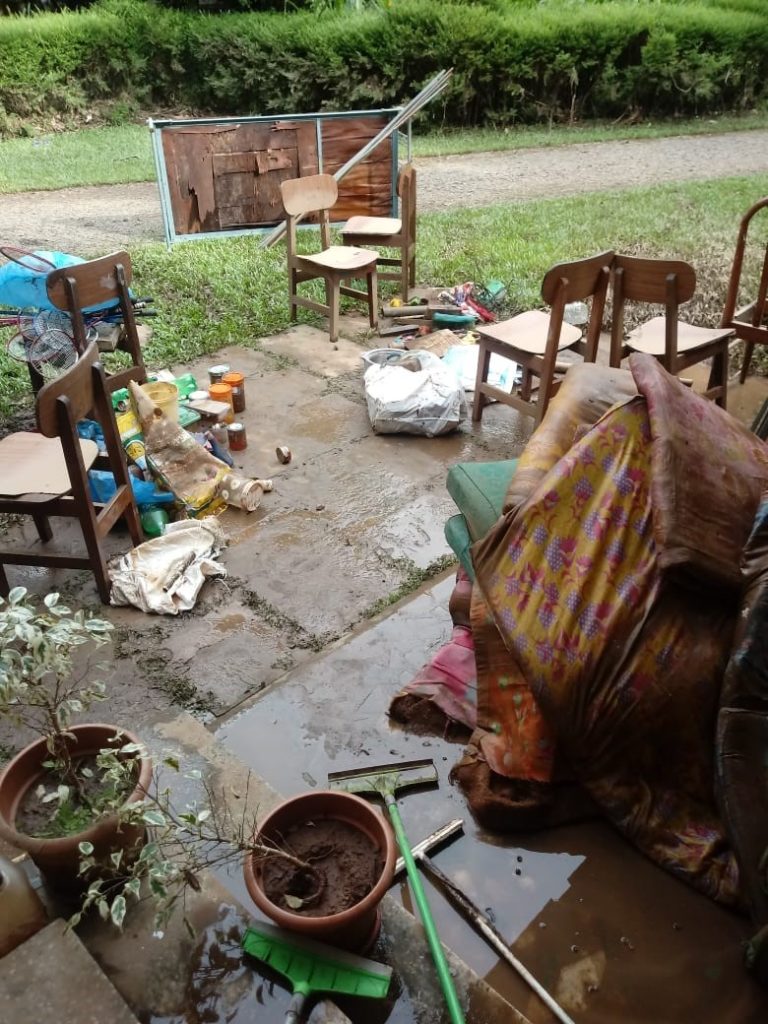 The damage caused by the flood was colossal. The furniture that was destroyed is going to cost us a lot. We need to do a lot of repair works to the building, painting the inner and outer walls of the buildings, and replacing the water-damaged furniture. We spent two more days with the Sacred Heart community, helping them in cleaning the seminary and assisting them in bringing things back to their normal routine. We really admired the dedication and commitment of our men in fighting the odds posed by the flood. The spirit of courage and forbearance they exercised was indeed praiseworthy.
The damage caused by the flood was colossal. The furniture that was destroyed is going to cost us a lot. We need to do a lot of repair works to the building, painting the inner and outer walls of the buildings, and replacing the water-damaged furniture. We spent two more days with the Sacred Heart community, helping them in cleaning the seminary and assisting them in bringing things back to their normal routine. We really admired the dedication and commitment of our men in fighting the odds posed by the flood. The spirit of courage and forbearance they exercised was indeed praiseworthy.
This experience came as a reminder that the difficulties we face don’t come to destroy us, but difficult times come to make us durable and tough. In a fight between nature and humans, nature seems to be devastating and destroying, but our men, like many others in Kerala, exhibited a great sense of unity and brotherhood. We appreciate and applaud the fight they put up against nature. As the old saying goes: ‘Tough times don’t last but tough people do’. The Kerala flood was indeed tough, but our men proved themselves tougher.”
Fr Syam Kumar MSC
Indian Union Secretary
